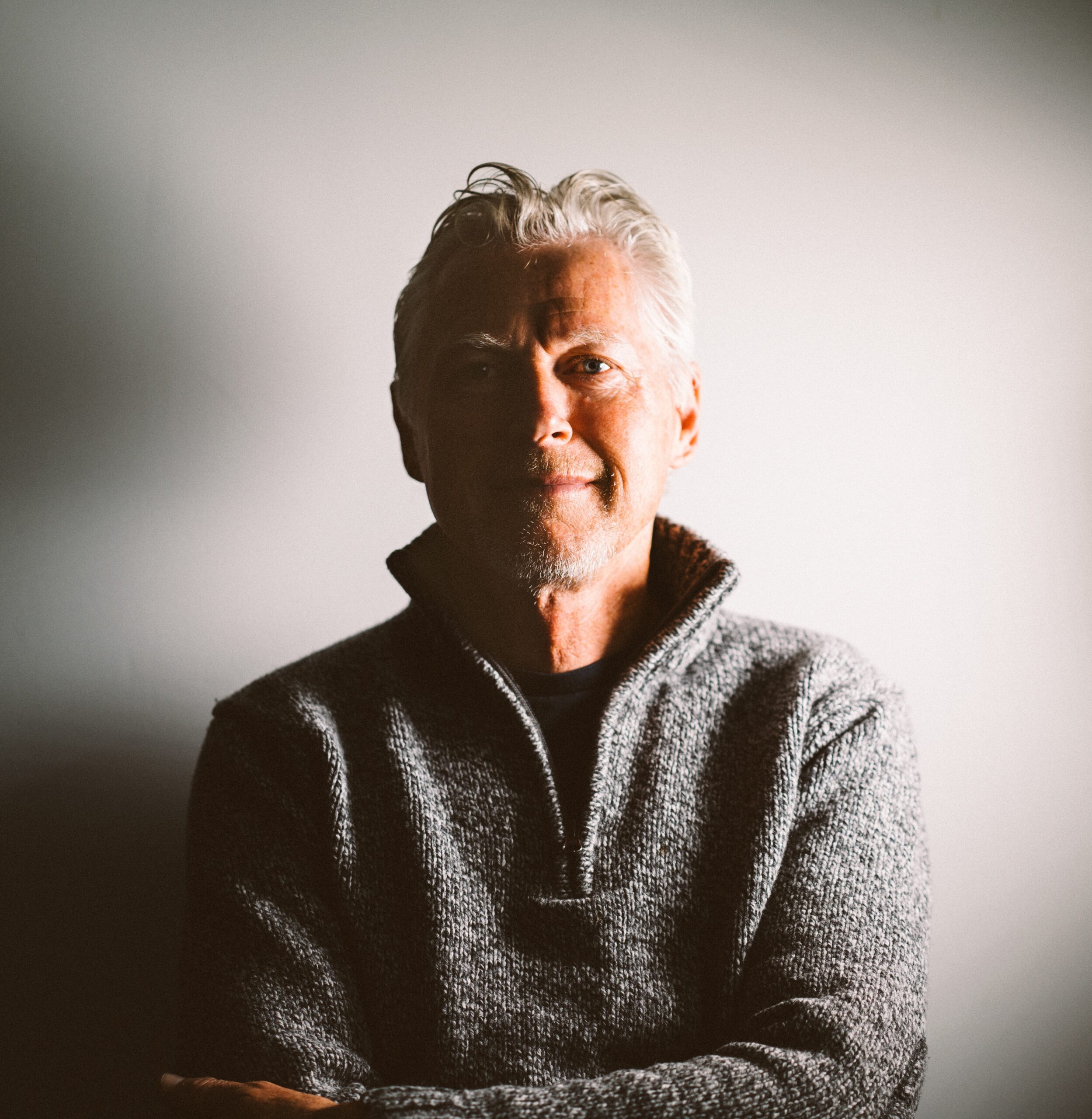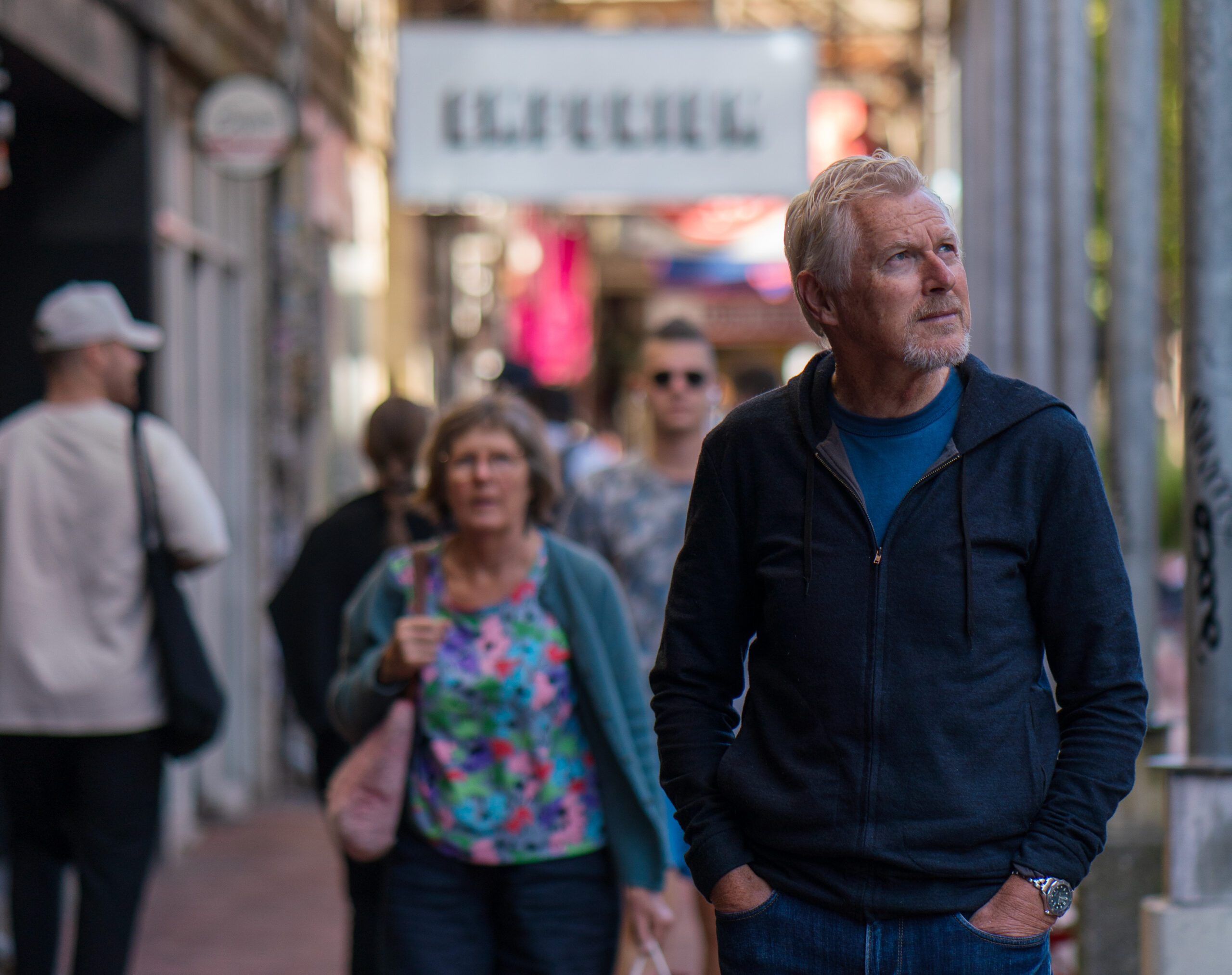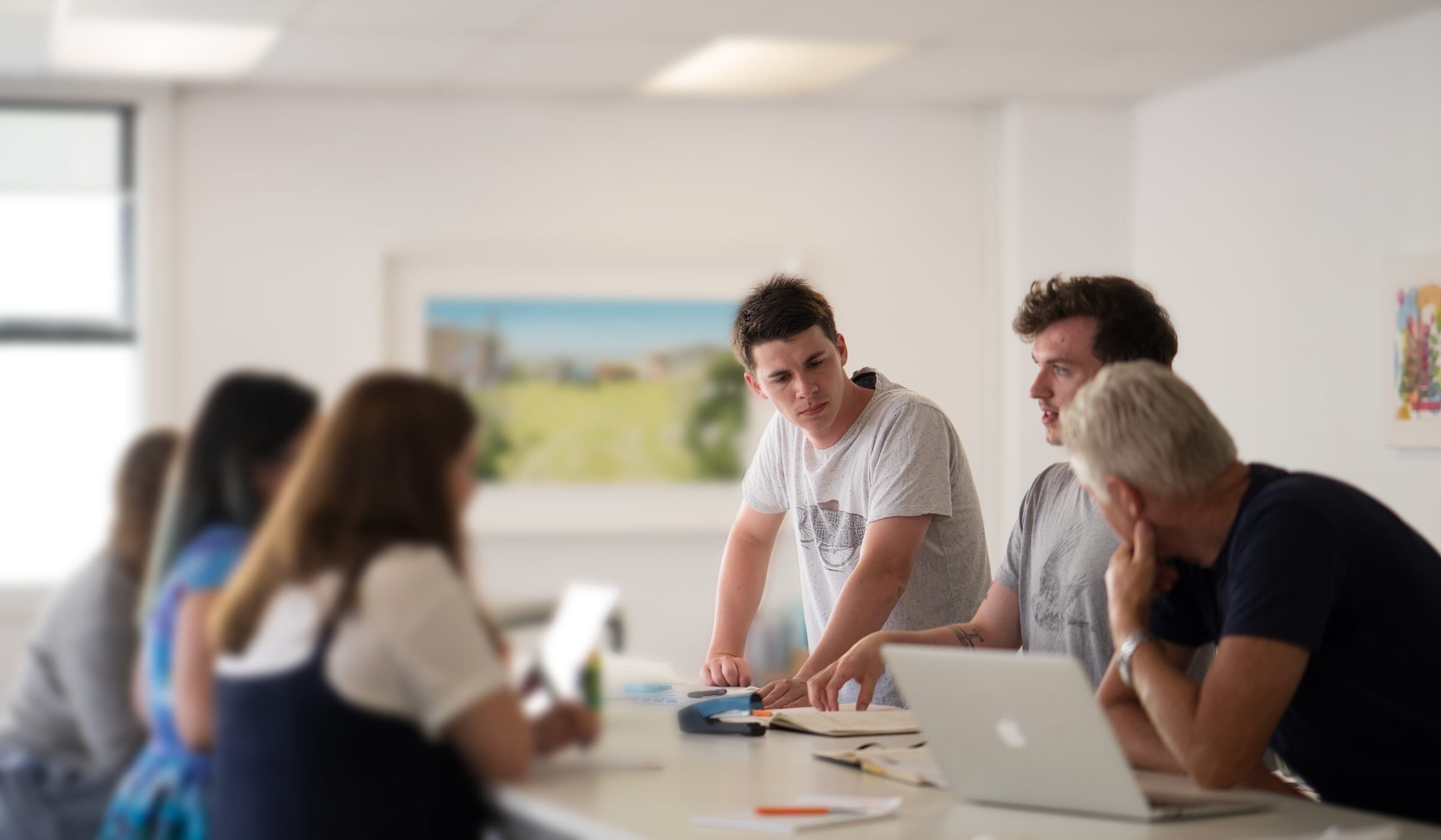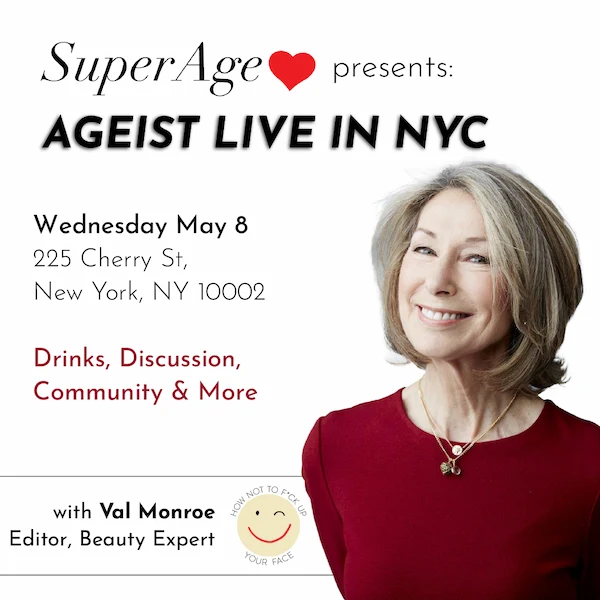This week, we are posting in its entirety a conversation with the remarkably insightful David Robertson. There is so much good here. Maybe take the extra five minutes, if you can, to read through it. If one is looking for a model for how to live well at our age in this modern, digitally-connected, and youth-obsessed moment, David is as good as it gets.

How old are you?
62.
Holding up very nicely.
Oh, thank you. My wife keeps reminding me how old I am. I always forget.
How old do you feel?
That’s a good question. I don’t know. I think sort of 40, 50-ish sort of thing, I suppose. I don’t know; somewhere in that — I certainly don’t feel 60, that’s for sure. It’s quite a shock to be 60.
Are you wearing an Oura Ring?
Yes, I am. Yeah.
How do you like it?
Good. Yeah, I do; I like it. I’m a type 1 diabetic, so I find that it supplements that really well. So a friend of mine recommended it and I kind of like the whole health data thing. I wouldn’t say it’s a super game-changer or anything else, but it’s a really good supplement.
And how long have you been a type 1 diabetic?
30 years. 35-ish I think I was when I was diagnosed.
Is that genetic?
No one knows. My parents are Scottish and the Scots are predisposed to diabetes. I had a virus; my immune system wiped out the virus cells which happened to be also the same cells in my pancreas. So, within a matter of weeks I was a diabetic and I’d lost 15 kg; it was quite a thing.
Wow. How is that impacting your health now?
I’m just so tuned in to it. It’s a pain in the butt because it’s not like you can have a day off, but you form habits and just very super aware. Sometimes you want to have a day off, but you can’t. But it’s okay.
And then how does it affect your diet?
If anything, it forces you to live a very healthy life. I find if I get stressed or get overtired, it impacts my control. All in all, if there’s an added benefit, it’s probably that. I was in the States in 2000 and they were promising a cure. I was working with a company called Applied Biosystems, and they were convinced that they were going to cure diabetes within the next year or two. And yeah, so, still hasn’t happened, but hey.

Tell me about the nature of your work.
I really didn’t begin a career till I was about 25, so this is going to be a slightly longer answer to your question. By 25, I had been a cyclist, a racing cyclist, and I’d raced in Europe. At 25, I decided I had enough of it. So, I then began a career. I had been a graphic designer, and then I got into advertising. What I found very curious is that no one, including the clients, nor the advertising agency, was remotely interested in customers, as in what drove them, what they wanted or needed. And so they were almost completely and utterly divorced from the work we were doing. And it just seemed very curious considering they were actually quite a significant part of the equation. Anyway, so my sort-of career unfolded.
I was always curious about the strategic component of a customer as a business grew. I started a bunch of startup businesses, so I figured if you knew customers intimately, very quickly you were going to be successful. But a really significant moment was: I started a dotcom with some other people in 2000 in San Francisco, and I was using deep psychology for online recruitment. We built this business and we had a ton of psychologists on staff. What I could see there is if you could use psychology to really understand how people worked and what drove them and what decisions they would make and so forth, and that was something that really stuck with me. And so, I carried on doing what I was doing. And eventually, I found my way back to New Zealand and I got two sons. I wanted them to grow up in New Zealand.
“And then I thought: I will start a business that’s completely focused on human behavior science”
And then I thought: I will start a business that’s completely focused on human behavior science. And I’ll apply human behavior science to business because I think it’s a key to the door for a really successful business but at a value-based level. I figured if you could utilize human behavior science and apply it to business, you could build really powerful relationships between the business and its customers; very value based. So that’s been the last few years of a journey and we’ve spent a whole bunch of time figuring out how to do that and designed some things and invented some things. And it’s proved to be really successful; it’s new, it sits right out there on the periphery. It’s really fascinating.
You’re 62 and you’re sort of on this edge of new thinking about consumers. You would think younger people would do such things, but you’re doing it. What’s your advantage?
Well, I can’t help myself. I mean, I’m a serial entrepreneur, so I love creating new things and inventing new things. Two things: I think having been super curious, it always helps. When I was starting this business, I initially tried to hire people who were experienced and had a track record in a variety of career pathways. So much of the problems we were trying to solve, we didn’t even know what the problem was. And so it didn’t work particularly well with people who had come from really quite an established career pathway. And so, I started to hire young kids — when I say young, straight out of uni; so, really young. And that actually worked really well because there was no preconceived idea of what we were doing or why we were doing it. So, it made me sort of think, “Hey, but what if we were to do this or try this and mixed with a whole bunch of really young team members who would pick it up and run with it?” Then you’ve got something really interesting, and a really interesting dynamic that is quite free form, but really drives some really interesting thinking.
And my job is to keep it on track, pointing in the right direction. And, yeah, I do look at myself and go, “Aww, I wish I was doing this about 10 years ago or 20 years ago. It would be really interesting and exciting but, hey, I’m here now, so what the heck?”
This is fascinating. If I understand correctly, the organization is — we have you at 62 and we have a bunch of people that are 40 years younger than you working with you? I love that.
I love it, too. It’s great. I have all these very surreal experiences. I was in the office the other day and someone walked in and said, “Oh my god, I found this fantastic band and it’s this guy called Gary Numan.” And I went, “Oh.” “Yeah, so new, it’s so cool energy.” I went, “Dude, I saw him in concert when I was 25 or something.” It’s quite a lovely cultural dynamic that keeps you young. It certainly keeps you fresh.
I met Gary Numan and his mom in 1982, 83. He was really young and he was with his mom.
That’s really cool. Yeah, I saw him in a pub in the UK playing, God knows how long ago. But, oh, he was with a band; he sort of had a keyboard and lighting was quite cool. And there he was in concert quite a bit later. Yeah.
“[Younger people] are very humanistic in the way they operate”
What is it that you’re learning from the younger people?
They’re amazing digital natives that have grown up with digital in a way that I haven’t. They’ve embraced digital right from the get-go. So, that’s interesting. It sounds rather obvious but, when it’s so unconscious, it’s a really interesting way to see the world because a lot of the work we do is global. We’re a small business, we’re a startup, in any sense, and so we have been working with New Zealand businesses going global, but we’re now moving into more global businesses. The idea of having a global landscape to deal with is something they cope with really well. It’s just natural for them. The whole sort of no-borders thing is really interesting.
I think younger people are enormously value-based; everything you can possibly imagine. I’ve got a lot of very strong value-based kids. I should stop calling them kids — they’ll kick my butt for that. They are good at telling me to slow down; they’re very humanistic in the way they operate. I guess my background of just hard work and to hell with the consequences — they’re not like that. They’re quite measured and balanced, which I didn’t expect at all.

Do you still ride your bike?
Yeah, for sure. Yeah, absolutely. I love it. It’s my sort of downtime, and I still like it.
What does a bike ride look like for you?
It can be anything from an hour to 5 hours. I’m still pretty intense with it. Yeah, I mean, I haven’t really stopped. It’s part of my DNA, I suppose. I love it for its ability to just have the downtime and then come back mentally fresh; and that’s pretty cool. And I live in a nice part of New Zealand. It’s semi-rural and it’s full of vineyards and winemaking, what have you, so it’s quite quiet. So it’s good for riding bikes.
“We together, we can do remarkable things”
Your business is very culture based; how do you stay in touch with things?
I think living out here, there’s a phenomenon in New Zealand, it’s called doing your OE. It’s exactly that phrase. And the OE is overseas experience. In New Zealand, when you get to 18 to 20 or something, you leave. Unfortunately for me, I got a lot of young team members who do that. And it’s a mindset; it’s an outward mindset. If you live here, most people, many people, it’s an outward mindset. So, you’re forever looking outward, and you travel. And so we travel a lot, New Zealanders, by and large. And when we have traveled, we’ve built connections all around the world and so you’re forever traveling to meet someone in the US or somewhere. So, that’s a thing, so you’ve got a real strong network.
And it’s a small country, so it networks itself really well. And just the usual being interested in media and so forth. But I think the cultural side is, New Zealand sits — it’s sort of transatlantic; it’s neither US-orientated, or UK-orientated or Europe-orientated. It’s quite neutral.
You said it’s an outward-looking mindset and you’ve also said that what’s driven you and your business is curiosity, and these two things seem very similar to me.
Curiosity is so, so important. I’ve always been incredibly curious about what drives people and hence human behavior science. My business is interested in anything human. We’re about human connectivity; we’re about connecting humans to ideas, concepts, causes, to themselves, to groups. We have this phrase which we love called “we together” and it’s so important. We together, we can do remarkable things. And so that outward mindset of looking at what other people are doing. When Kate suggested your business, I looked and I got to love this. It’s just so absolutely humanistic. It’s beautiful what you’re doing. I love what you do. And so, connecting to those things and finding them and reconnecting. So, I think it’s our duty to connect.
The world is actually quite a small place; technology helps you connect so much stuff widely in an appropriate way. When you live on the other side of the world in the way we do, it’s just a way of thinking. And you’re not in the middle of Europe where you can drive across the border this afternoon and you’re in another country. Everything’s a two-hour flight, three-hour flight minimum. You grow up with a very, very different mindset, and you come back to New Zealand.
“Covid was an extraordinary time to be in [New Zealand]”
We together, which is something that here in the US was really strong in the ’50s, ’60s, ’70s, and now together seems like sort of an evil word. Government used to be an expression of working together, and now it’s this other thing. Talk to me a little bit about that.
When I was living in the US in 2000, I was part of the dot-com boom and it was very strong “we together.” There’s a real collegiate sort of energy. However, yeah, we’re sitting in a world when “we together” gets replaced with a fear of you versus me. Fear is an enormously powerful motivator for human beings. And so, if media and context can play on fear and drive it home, it destroys “we together.” We together devolve down to small communities as opposed to a wider community. And I think that’s where the US is right now.
It’s quite saddening. It’s a pendulum; it’ll come back to somewhere. The UK is not far away from a similar sort of place. And New Zealand has moved from an incredibly “we together” — Covid was an extraordinary time to be here. In Covid, I’ve never seen anything like it, to feel community at such a massively wide level. We did this Covid thing where we’re all in it together, a team of four million or five million, whatever it was, is incredible. And that’s devolved down into a little more fragmented. So, I hold hope for the human race and its joining itself up again in pieces. But digital is not a great friend for humans; digital environments are not good.
I think what you’re doing is remarkable. I showed it to my young people and I said, “Oh. Look, there’s a whole bunch of old folks.” And they went, “Oh, it’s not. They’re really good, they’re not old.” I’m going, “Oh, thanks.”
Youth marketing is all about inspirational, aspirational. Somehow, after about 40, it becomes as if you’re a medical problem in need of a solution. And I’m like, “What’s inspirational about that? Who wants that?”
Yeah. As soon as I saw it, I thought, “Oh, there’s a zeitgeist right there.” I thought, “Wow, that is so on it,” because I looked at your site and I thought — I initially thought, “Oh, I don’t know, it’s going to be that retirement-village-type celebration. Oh, man, it’s got to be cringey.” And then it’s like, “No, it’s people later in their life, or whatever term you want to use, and they’re still doing some incredible stuff. In fact, they’re not still doing it, they are doing more of it.” And that’s something that is a really different mindset. But it shouldn’t be a different mindset. It should be the same mindset.
“To believe that I have to act my age, so to speak, is nuts”
It’s changed a little bit, but about 40% of my audience is under 50, and a quarter of my audience is under 30.
“Hey, I’m 50, so I should behave like a 50-year-old.” But no, you’ve got this whole vast body of people who don’t subscribe to that, and this is not a place for them to go there. And so, when I saw your site, I thought, “Oh, that’s new.” Oh, God, I love that because I’ve got tons of friends and we all subscribe to the same sort of thought, and we find it kind of amusing, like, we’re riding bikes fast but we’re also a bit tongue-in-cheek about how back in the day we used to be able to win races and ride fast, but not anymore. And it’s funny, it’s comical, and it’s kind of nice to have both: to be where we are and look back and go, “Hey, that was cool,” not to regret it. So I love that.
You use this phrase, “not age bound.” How does “not age bound” apply to you?
Well, so far, I don’t feel restricted in any way. Touch wood. I think that’s a good thing. I don’t wake up in the morning feeling physically compromised. I certainly don’t feel compromised mentally. But I think it’s just that. I think it’s a compromise thing, whether that’s a mindset or whatever the case may be. I’ve just started a startup business and I’ve got a couple of others, so why would I say to myself, “I am 62, I should not do these things”? That’s crazy; to believe that I have to act my age, so to speak, is nuts. Why shouldn’t there just be more, do more things with more people, with younger people? We’re living longer; our healthspan is longer. The only inhibitor is your mindset.
You mentioned a couple of things there about mindset and how you feel at a certain age. How is mindset linked to your sense of physicality?
I was racing at a pro level right up until 25. So, I knew what I was doing. I could win races at 30, no problem. I could win races up until about 40. And about 45, I stopped. It started to get hard; my age and my physical strength wasn’t what it was. And that was the first time, was like the realization that, “Oh, there’s a limiter now.” And so, there was quite a moment to realize that actually, this age, it’s real. And so, I could win races if I was super smart, and because I was old and wise and could do things and strategic, I could win the odd race.
I got older and that wasn’t good enough anymore. It was just simply one of, “That’s okay, you’re getting older.” For me, riding the bike has been a data point for just seeing how things unfold. So far, if I want to go do a five-hour ride, I can go and do a five-hour ride, and I don’t think that’s going to be an inhibitor for a while. If I want to do a five-hour ride in 10 years’ time, I’ll buy an e-bike and do whatever. Being very comfortable with the limitations on the body is just part of being who you are.
“Starting from a point of being gentle and kind is a really very powerful place to be”
What kind of music do you listen to?
I’ve just kind of gotten right back into old stuff again because I’m doing a bit of driving. Some nice New Zealand band called Fly My Pretties. I’m so in love it. R&B sometimes. If my son’s got something interesting, he’ll give it to me just to fry my brain.
What are the three non-negotiables in your life?
It’s curiosity. Openness, curiosity, the “what if,” “what can be” type thing. And “we together.” Your first thing must be “we together.” I think the idea of — our prime minister coined the term gentle and kind. We’re humans, man. We aren’t robots. We’re not very tough. So, starting from a point of being gentle and kind is a really very powerful place to be, and it doesn’t cost you much.
When you say gentle and kind, I think of the famous rugby team, the All Blacks.
Yeah, that’s true. However, one of the things that, how they became very successful is they did a U-turn on their culture, and they went from being winning at all costs, and they said, “Our job is to grow young men who happen to be world-class All Blacks.” And so, they had to be really gentle and kind with these young men to grow before they could be great All Blacks. And so, that was when they really got it. They still subscribe to some of that. Yeah. Seriously, if I had an All Black running toward me with a ball, I’d step to the side, man.
Connect with David:
LEAVE A REPLY
The ideas expressed here are solely the opinions of the author and are not researched or verified by AGEIST LLC, or anyone associated with AGEIST LLC. This material should not be construed as medical advice or recommendation, it is for informational use only. We encourage all readers to discuss with your qualified practitioners the relevance of the application of any of these ideas to your life. The recommendations contained herein are not intended to diagnose, treat, cure or prevent any disease. You should always consult your physician or other qualified health provider before starting any new treatment or stopping any treatment that has been prescribed for you by your physician or other qualified health provider. Please call your doctor or 911 immediately if you think you may have a medical or psychiatric emergency.



What an interview, and what wisdom. David Robertson beautifully expresses what so many of us are living. We aren’t “acting our age,” nor do we plan to conform to what the “senior” culture in the US expects.
He is spot on about working with those younger than you–I did that in a startup for several years before retirement and it was my best growth experience, by far.